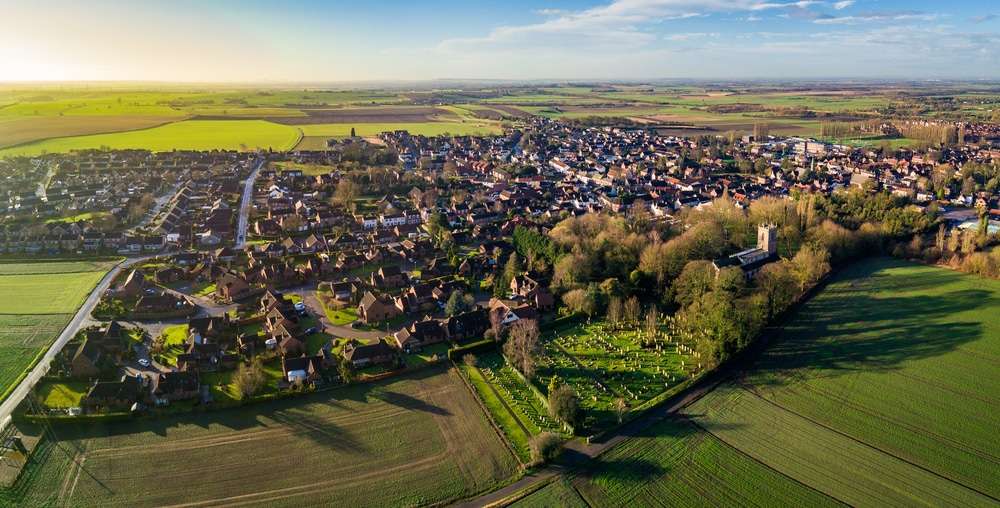Earth Day 2023 – To best invest in collective climate action, let’s support local government this Earth Day
EARTH DAY 2023

Friday, 21 April 2023
TO BEST INVEST IN COLLECTIVE CLIMATE ACTION, LET’S SUPPORT LOCAL GOVERNMENT THIS EARTH DAY
By Casey Harris, ICC Analyst
Earth Day this year will stoke criticism of global governments for failing to act on climate change: Nearly every country in the world is not on track to meet 2050 net zero targets. But local authorities offer an alternative focus for collective action that can make real progress and counter an increasingly prevalent narrative that we are doomed to fail in our environmental efforts.
On April 22, Earth Day’s organisers will urge billions around the world to help accelerate the transition to green economy with a campaign hashtag #InvestInOurPlanet. Because of the scale and wide-ranging impact of the emergency – and the massive collective action needed mitigate its worst effects and adapt to the warming that has already been locked in – much of the day’s conversation will be framed in national or international terms.
Here in the UK, less than 40 percent of the UK’s required emissions reductions are supported by proven policies and sufficient funding, according to the Climate Action Tracker website. Campaigners recently warned that a planned road-building spree by the Department of Transport could further derail net zero targets, while experts have warned government that stagnating recycling rates and waste incineration could also impede its 2050 target. Effective climate action is also challenged by the fact that the UK has some of the least energy-efficient homes in Europe.
The good news: Councils have direct influence over these sectors and others that contribute large portions of the UK’s total emissions. 23 percent of national emissions come from transport, 17 percent from buildings, 11 percent from power generation, and 5 perecent from waste management. Councils can implement a wide range of solutions that make a big impact on these carbon sources. They can also act as incubators for innovative new ideas and offer opportunities for communities to work together to develop solutions. Local authorities are close to the issues and have capacity to act quickly and with agility. Recognising the scale of the climate challenge, 340 have declared Climate Emergencies and over 285 have established Climate Action Plans.
At ICC, we are working with many of those councils and sustainability and resilience is baked into every piece of work we do with them. Local leaders understand that a new home built to less than net zero standards is a retrofit requirement in the near future. They understand that active travel infrastructure not only improves the quality of their cities, but also benefits the environment. They understand that investing in decarbonisation has massive economic benefits. And they understand the urgency with which the climate crisis needs to be addressed.
We’re working with Cornwall Council to explore the potential for a low-carbon district heating network in the town of Truro and continuing our work on the Pydar Street development which will provide 164 new net zero homes in the city centre.
We supported Islington Council to get its Bunhill 2 Energy Centre back on track to achieve its goal of using sustainable energy to help local people. The Centre – using state-of-the-art technology to extract waste heat from the London Underground – is now reducing resident heating bills and carbon emissions while improving local air quality and making the city more energy self-sufficient.
In Birmingham and other cities we’re helping councils to develop programmes of work for reaching net zero, using our CASE (Climate Action Social Economic Value) framework to quantify the economic benefits of interventions and to justify greater investment in climate change mitigation.
Investing in climate action grows more important every day. The hopes and health of the next generation depend on it. Children and young people reveal huge climate anxiety and pessimism for the future of humanity in current surveys. One recent international poll on youth attitudes toward climate change found that three-quarters of 16-25 year olds said the future was frightening.
Local authorities can foster real action and offer a positive source of hope for all the generations that make up our communities. It’s an exciting time to be working in local government – the potential to make an impact and deliver on climate ambitions has never been larger.
This Earth Day, ICC is proud to be helping councils invest in our plant to pave the path towards a prosperous future for everyone.

From last year’s Earth Day:
INVESTING TO RENEW OUR FUTURE ISN’T AN OPTION – IT’S THE ONLY CHOICE THERE IS.
Thursday, 22 April 2022
By Nick Blackmore, Managing Consultant and Renewable Futures Lead at Inner Circle Consulting.
Earth Day was first held on April 22, 1970, the year Joni Mitchell sang “You don’t know what you’ve got ‘til it’s gone” and millions of people across the United States held street protests over the destruction of the environment.
Two years earlier, the first human spacecraft had reached the moon. As the astronauts of Apollo 8 sent back photographs of Earth to an awestruck public, the planet’s beauty sparked mass awareness of its fragility too, and rising air pollution and increased use of pesticides prompted debate about the impact of human actions on climate degradation. The first mass public action to save the planet was a hopeful and exciting moment.
Today, 52 years on, the official theme for Earth Day 2022 is Invest In Our Planet. We mark the day two weeks after a United Nations report said the world was running out of options to hit climate goals – with only immediate, sweeping societal transformation now able to stave off catastrophic warming. Campaigners are still doggedly making the same basic pleading as in 1970 that we need to look after our earth.
I run the Renewable Futures team at Inner Circle, and we work every day with the knowledge that climate change is the single greatest threat to a sustainable future – so investing in climate action is vital to prosperity. A climate action plan is not an expense. It is the only way to deliver growth and prosperity for all.
While politicians haggle over green levies and the public struggle with individual decisions about car use and recycling, at ICC my colleagues and I do the practical work of taking climate action every single day, with local government and community partners across the U.K. It’s not rocket science. It’s planning for net zero – whereby carbon dioxide emissions are balanced out – in a way that delivers core public sector responsibilities on jobs, housing, the economy and every facet of community life.
Right now, we’re working with Cornwall Council to find, produce and distribute heat that can pioneer new ways of living while tackling the climate emergency. Side by side with local council workers and community leaders, our local team is creating low carbon buildings in Truro while championing clean energy, urban agriculture, and the electric revolution. In Pydar, we are accelerating the delivery of new homes and business growth while achieving 60 percent energy regeneration on site – and delivering long-term financial returns that can be reinvested for social purposes such as employment, training, improved air quality and increased biodiversity.
In Birmingham, we are translating the U.K.’s second city’s carbon impact analysis into practical work that can deliver carbon savings from day one, while also putting in place the infrastructure and policies to achieve full decarbonisation. We worked with leadership and council staff to identify buildings and assets that could be retrofitted for reducing carbon emissions whilst improving the long-term investment opportunities for city properties.
And in the London Borough of Islington, having helped deliver a first-of-its-kind project that used heat from the London Underground to tackle fuel poverty on housing estates, we are now helping the council to electrify, over the next five years, its entire fleet of vehicles, from park-keepers’ vans to refuse lorries. In one of the most polluting boroughs in the UK we are working to eliminate 2,800 tonnes of carbon a year – the equivalent of planting five football pitches of forest.
All of these councils know that tackling climate change doesn’t just create better homes, streets and services but also supports public health, productivity and well-being. All of these councils know that none of these are competing priorities, but have to happen together. For one to work, they must all work.
And all of us doing this work also know that the investment of private enterprise in such schemes is an essential form of support. That investment need is particularly keen given the urgency of the work. We have been glad to work with socially responsible investors on the Pydar scheme in particular, and would encourage more in the corporate world to fully embrace their social value commitments. Where they lead, others will follow.
Investing in the planet means creating employment and training on green technology and skills. It means improving the environment and health of your communities. It means delivering better insulated and heated homes, and better air, and alleviating fuel poverty. It means understanding there are real economic benefits and also social benefits in every climate action we take, that grow resilient and hopeful communities.
Because we don’t have another 52 years.


